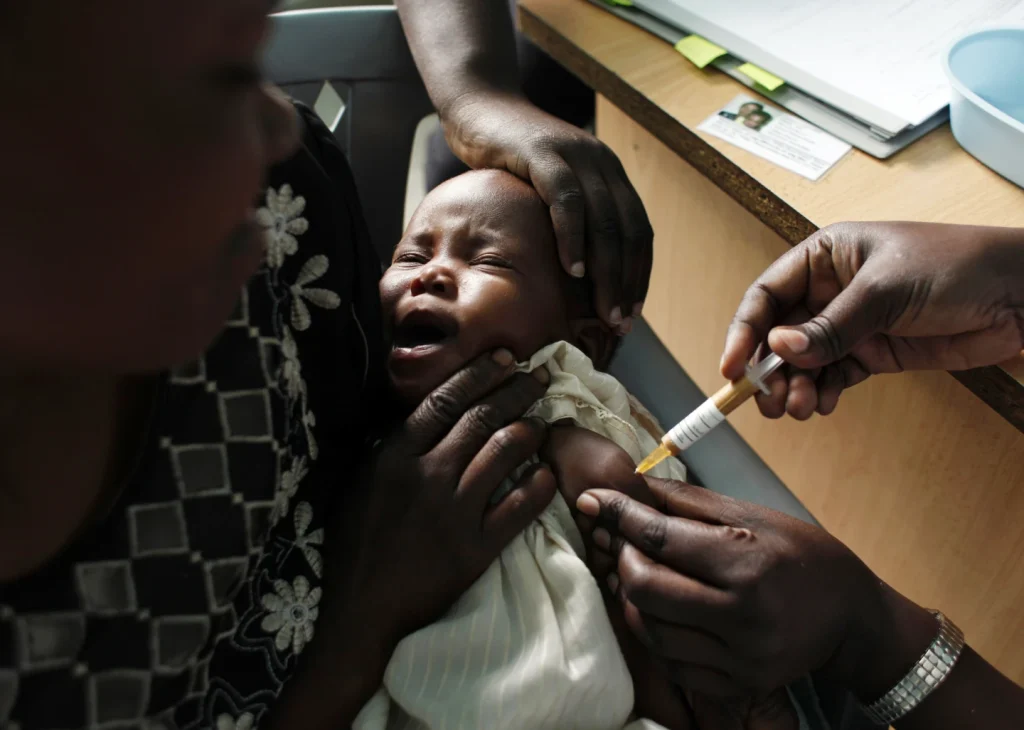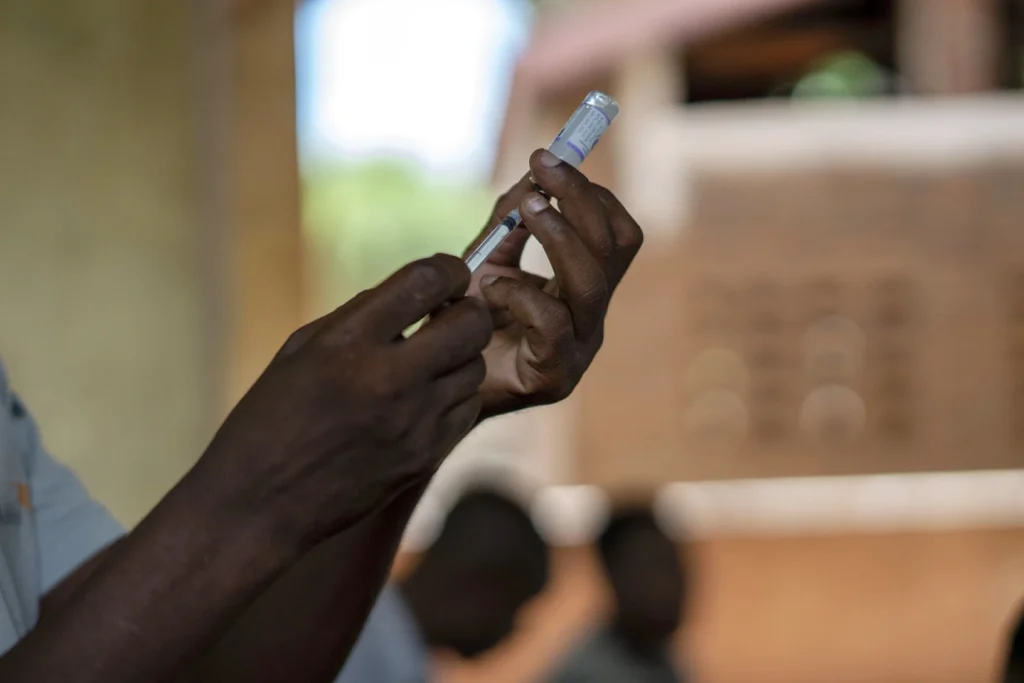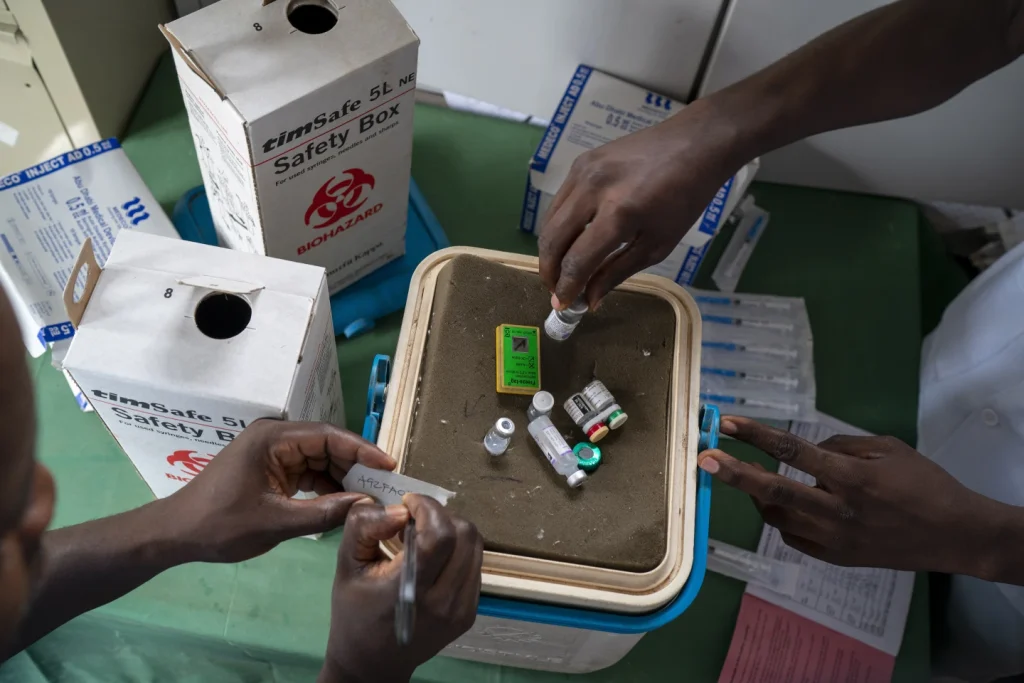Cameroon is set to make history as the first country to routinely administer a new malaria vaccine to children as part of a widespread initiative across Africa.
This groundbreaking campaign, scheduled to commence on Monday, has been hailed by officials as a significant milestone in the ongoing battle against the mosquito-borne disease, which is responsible for a staggering 95% of global malaria-related fatalities.
The introduction of this vaccine is poised to have a transformative impact on public health in Cameroon, offering a beacon of hope for families and healthcare systems grappling with the burden of malaria.
Aurelia Nguyen, the chief program officer at the Gavi vaccines alliance, emphasized the life-saving potential of the vaccination, highlighting its capacity to alleviate the strain on both individuals and the nation’s healthcare infrastructure.
Cameroon has set an ambitious target of vaccinating approximately 250,000 children within the next year, with plans to extend the program to cover even more children in the subsequent year.
This concerted effort is being supported by the Gavi vaccines alliance, which is collaborating with 20 other African countries to facilitate access to the vaccine.
It is estimated that, collectively, these countries will immunize over 6 million children by the year 2025.
The significance of this initiative cannot be overstated. Malaria remains a pervasive and devastating public health challenge in many African nations, exacting a heavy toll on communities and straining healthcare resources.
The availability of an effective vaccine represents a monumental stride forward in the fight against this relentless disease.
Furthermore, the implications of Cameroon’s pioneering role in the widespread distribution of the malaria vaccine extend far beyond its borders.
By spearheading this initiative, Cameroon is not only safeguarding the health and well-being of its own population but also setting a precedent for other nations to follow suit.
The ripple effect of this endeavor has the potential to catalyze a continent-wide shift in the approach to malaria prevention and control, ultimately saving countless lives and alleviating the burden on healthcare systems across Africa.
The road ahead may be fraught with challenges, including logistical hurdles and the need for sustained investment and support.
However, the launch of this vaccination campaign in Cameroon marks a pivotal moment in the global fight against malaria.
It serves as a testament to the power of collaboration, innovation, and unwavering commitment to public health.
As the first doses of the malaria vaccine are administered in Cameroon, there is cause for optimism and renewed determination.
This momentous occasion symbolizes a triumph of science, perseverance, and collective action, offering a glimmer of hope in the ongoing quest to overcome one of the most formidable health challenges of our time.
Cameroon’s bold step forward is a testament to the resilience and resolve of the human spirit in the face of adversity, and it paves the way for a future in which malaria no longer casts a shadow of suffering and loss over the African continent.
Malaria, a parasitic disease transmitted through the bite of infected mosquitoes, continues to pose a significant public health challenge in Africa.
With approximately 250 million cases reported annually and a staggering 600,000 deaths, predominantly among young children, the urgency to combat this disease is paramount.
In light of recent developments, particularly the introduction of the Mosquirix vaccine in Cameroon and the ongoing discourse surrounding its effectiveness and practicality, it is imperative to delve into the complexities of malaria vaccination and its potential impact on the African continent.
Cameroon’s decision to utilize the Mosquirix vaccine, the first of two recently approved malaria vaccines, marks a significant milestone in the fight against malaria.
Endorsed by the World Health Organization (WHO) two years ago, Mosquirix has been acknowledged for its potential to substantially reduce severe infections and hospitalizations, despite its imperfect nature.
However, it is crucial to acknowledge the vaccine’s limitations. With an efficacy rate of approximately 30%, the need for four doses, and a gradual decline in protection over time, the vaccine presents challenges in ensuring sustained immunity among at-risk populations.
Furthermore, the production capacity of Mosquirix is constrained, with GlaxoSmithKline (GSK) indicating an annual capacity of only 15 million doses.
This raises concerns about the vaccine’s accessibility and widespread distribution, particularly in regions heavily burdened by malaria.
Consequently, the feasibility of relying solely on Mosquirix as a comprehensive solution to malaria prevention and control is subject to scrutiny.
Amidst the discourse surrounding Mosquirix, attention has turned to an alternative malaria vaccine developed by Oxford University and endorsed by the WHO in October.
This vaccine, characterized by its cost-effectiveness, requirement of three doses, and the substantial production capacity of up to 200 million doses annually by India’s Serum Institute, presents a compelling alternative to Mosquirix.
The prospect of a more accessible and sustainable vaccine has sparked optimism within the global health community.
The potential for increased coverage and affordability holds promise for addressing the immense burden of malaria in Africa.
However, it is essential to approach this alternative with a critical lens, considering factors such as efficacy, long-term immunity, and the logistical challenges associated with large-scale vaccine deployment.
The introduction of malaria vaccines, whether Mosquirix or its potential alternatives, underscores the intricate interplay of scientific innovation, public health policy, and socioeconomic considerations.
While vaccines offer a pivotal tool in malaria control, their impact is contingent on a multifaceted approach that encompasses robust healthcare infrastructure, community engagement, and sustained funding for immunization programs.
Moreover, the complexity of malaria as a disease necessitates a comprehensive strategy that integrates vaccination with existing interventions such as mosquito control, early diagnosis, and prompt treatment.
Recognizing the interconnected nature of these efforts is essential in shaping a cohesive and sustainable approach to malaria eradication.
The ongoing utilization and evaluation of malaria vaccines, exemplified by the introduction of Mosquirix in Cameroon and the emergence of alternative candidates, reflect a dynamic landscape in the fight against malaria.

As Africa grapples with the staggering burden of this disease, the imperative to harness innovative solutions, while addressing their inherent challenges, remains paramount.
The journey towards effective malaria vaccination demands a concerted effort from global health stakeholders, policymakers, and communities.
It is within this collective endeavor that the potential for transformative impact on the trajectory of malaria in Africa lies.
By navigating the complexities of vaccine efficacy, accessibility, and integration within broader malaria control strategies, the prospect of mitigating the devastating toll of this disease becomes increasingly tangible.
In conclusion, as we navigate the evolving landscape of malaria vaccination, it is imperative to uphold a steadfast commitment to equity, sustainability, and scientific rigor.
The journey towards a malaria-free future for Africa hinges on our ability to leverage the power of vaccines as part of a comprehensive, inclusive, and resilient approach to public health.
The statement made by Gavi’s Nguyen regarding the potential availability of the Oxford vaccines for immunizing people later this year has sparked a significant amount of interest and discussion within the global health community.
This development has the potential to have a profound impact on the ongoing efforts to combat malaria, a disease that continues to pose a significant threat to public health in many parts of the world.
It is important to note that while the potential availability of the Oxford vaccines is certainly a positive development, it is not a silver bullet solution to the problem of malaria.
As pointed out by Nguyen, neither of the malaria vaccines currently in development are designed to stop the transmission of the disease.
This means that other tools and interventions, such as bed nets and insecticidal spraying, will continue to be critical components of malaria control efforts.
The fact that the malaria vaccines do not stop transmission is a crucial point to consider. While vaccines can be incredibly effective at preventing individuals from becoming infected with a disease, they do not necessarily prevent the spread of the disease from person to person.
In the case of malaria, which is primarily spread by infected mosquitoes, this means that even if a significant portion of the population is vaccinated, the disease could still be transmitted and continue to pose a threat to public health.
This is why it is essential for malaria control efforts to take a multi-faceted approach. In addition to the potential use of vaccines, it is crucial to continue to implement and expand upon other proven interventions, such as the distribution of bed nets and the use of insecticidal spraying.
These tools have been shown to be effective at reducing the incidence of malaria and preventing the spread of the disease, and they will continue to be necessary even if vaccines become available.
The symptoms of malaria, which can include fever, headaches, and chills, can be debilitating and even life-threatening.
The disease has a particularly devastating impact on vulnerable populations, including young children and pregnant women.
As such, it is imperative that efforts to combat malaria continue to be a priority for global health organizations and governments around the world.
In conclusion, while the potential availability of the Oxford vaccines for malaria is certainly a positive development, it is important to recognize that it is not a standalone solution to the problem of malaria.
Other tools and interventions will continue to be critical in the ongoing efforts to control and ultimately eliminate this devastating disease.

It is essential that we continue to support and invest in a multi-faceted approach to malaria control, one that includes the potential use of vaccines alongside other proven interventions.
Only by taking a comprehensive approach can we hope to achieve meaningful progress in the fight against malaria and protect the health and well-being of communities around the world.
